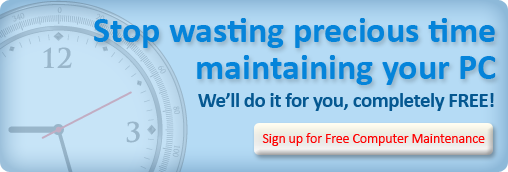Over time, the speed of all computers running Microsoft Windows will decrease. It’s like the natural aging process. But also like the natural aging process, there are steps you can take to improve the performance and help your PC run sustain smoother performance over time.
You will notice the aging, as your PC begins taking more time to respond, or open files and folders. You may even notice a decrease in the speed of your Internet connection.
Here are 7 great steps you can take to improve your computer’s performance.
1. Defragment Your Hard Drive
As you add more programs, files, and documents to your computer, you build up and increased likelihood that parts of the same file are stored in various locations on your hard drive. When considering how many files and programs you have, you can begin to understand how this would slow down your PC, as your computer has to locate the files in many locations.
This is why occasional defragmenting is necessary. This task will relocate all information for each file in one place, which of course results in a faster PC.
2. Scan for Viruses, Spyware and Adware
Every Windows computer is vulnerable to viruses. Viruses are nasty little programs that cause both major and minor problems for users.
Spyware and Adware are programs created by companies to find out more information about customers, so they can better market products to them. Usually these programs are not created for malicious purposes. Spyware and Adware can load into computer memory and slow it down.
Periodically scanning and removal of Viruses, Spyware and Adware is a great way to improve computer performance.
3. Clean Your Desktop
If you have dozens of icons on your home screen, clean it up. Each icon is simply a shortcut that has to find the actual file. This not only slows down your computer, but it can also slow down your productivity as it defeats the purpose of having a desktop for quick access to your frequently accessed programs.
4. Uninstall Unused Programs
Over time, you may have accumulated programs on your computer that you do not use. When a program is installed, it creates connections between the program and the operating system. Even if you don’t use these programs, they can slow down your system. If you have the original program’s installation disk or file, removing programs will free up space on your computer and may speed up your system’s performance.
5. Run an Error Scan For Your PC
Over time, it becomes increasingly more likely that one or more of the Windows files necessary to run your PC has become corrupted or damaged. When this occurs, you will also notice a decrease in the speed of your PC. Microsoft has free tools that can help your perform this scan on your Windows PC.
6. Limit your extra-cool visuals
How much do your like all of the cool visual effects that Windows offers, many of which are pre-activated. While these may look nice, they actually slow down your PC performance, since extra computing power is being used to create the visuals as well as load your window or menu. This case is especially true if you have a limited amount of system memory.
Go ahead and turn off some of these features. The loss in visual appeal will be made up for in the speed and performance of your PC.
7. Don’t Load Programs at System Startup
You may notice that some program you install will ask if you would like to have the program load automatically when Windows loads up on your PC just after you turn it on. What they don’t tell you is that these programs can slow down the startup speed of your computer, since they use up extra memory that would otherwise be designated to the PC startup process.
If you keep these programs from loading at Windows startup your PC’s speed and performance will increase.
If you have any other tips on how to speed up your PC, feel free to share in the comments below.